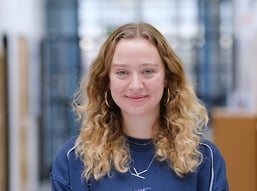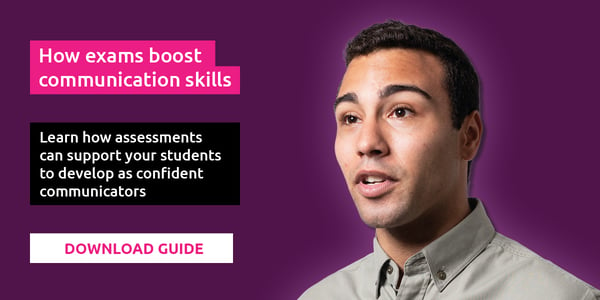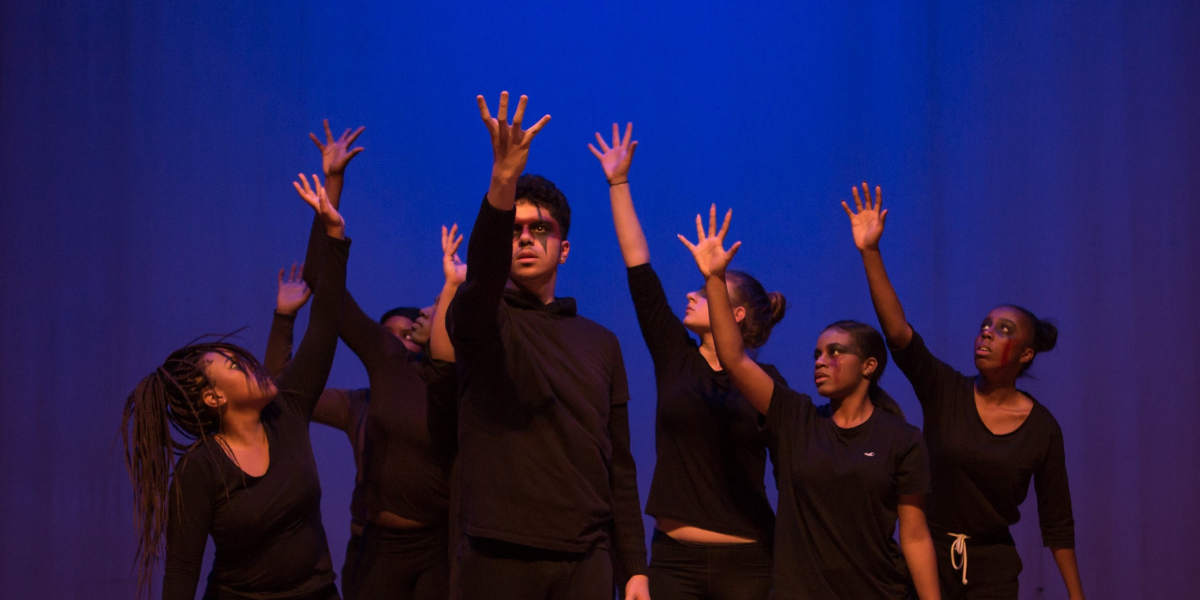
How preparing for a Communication Skills exam boosted one student’s public speaking confidence
BY: Tom Inniss
01 March 2022
In this blog post we hear from Katie, a Year 13 student at Trinity Champion Centre, Godolphin and Latymer School who spoke to Tom Inniss, editor of Voice Magazine. Katie explains how preparing for Trinity’s Communications Skills exam not only helped develop confidence in expressing her own opinions and but also further hone the communication skills she had developed via the Speech & Drama specification. Read on to find out why Katie would ‘100%’ recommend Communications Skills qualifications to other students.
Katie Benson, Grade 8 (distinction) Communications Skills

Katie is 17 years old with a passion for drama. She recently achieved a Grade 8 distinction in Communication Skills and is no stranger to Trinity College London qualifications, having earlier completed Grades 3-5 in Speech & Drama.
Katie had also prepared for Grades 6 and 7, but she missed the exam for Grade 6 because of illness, and her Grade 7 was cancelled at the start of the pandemic. However, her school felt that she would be capable of jumping straight into Grade 8 alongside her A-level studies. Katie was offered the opportunity of continuing with Speech & Drama, but she elected to switch to Communications Skills, feeling the specification would enable her to develop as a more rounded student and allow her to focus on public speaking.
Katie explained what appealed to her about the Communication Skills specification: ‘It was the opportunity to have a more active role in the exam, and in the material that I performed. The idea of being able to produce my own presentation and come up with my own topics for discussion was more appealing to me than just learning a piece of prose again. It felt like I was going to learn more skills doing it.’
Katie’s experience of working towards the Communication Skills exam
Katie worked on her Communication Skills qualification alongside her four A-level subjects. She was taught by her drama teacher (at Godolphin and Latymer school) in a small cohort of just three other students. Her teacher is extremely familiar with the Communications Skills syllabus; this came across via the detailed breakdown of the rubric Katie received. For example, her teacher advised her to really think about what her contentious issue could be and ensure that it is something that had two clear opposing viewpoints. This ultimately led to Katie choosing to explore the debate around the repatriation of art.
She found the experience refreshing, enjoying the process of conducting her own independent research to create the presentation and injecting her own voice into it, rather than just learning something by rote.
She said of the experience: ‘I really did enjoy the process of preparing, because I was given the freedom to do it on any topic. I genuinely enjoyed researching and finding the content for my presentation.’
Interestingly, it was the shift from having to embody a character to confidently presenting her own voice that was the most difficult part of the process for Katie. She felt she had to notch down the dramatic aspects of her performance and recognise that adjustment from ‘trying to become a character to having to stand up and give a speech’.
Katie undertook a face-to-face Communications Skills exam, with the examiner attending a session at her school – an experience she was grateful for, admitting that she would have considered giving a presentation virtually (for an online exam) ‘quite nerve racking’.
Impact of the experience
The main impact Katie identified from her experience of working on her qualification was on her willingness to speak in public. Before the exam, the thought of doing a presentation would have kept her up at night, but after her Communication Skills journey she feels much more comfortable when delivering a speech in front of an audience.
This has helped her with her role on the school’s sustainability committee, where she now can confidently ‘stand up on a stage in front of 200 12-year-olds’. She now knows what is needed to create a good presentation, and how to keep an audience’s attention. The experience also helped her develop a wider range of improvisation skills, allowing her to think on her feet and nimbly react to changing situations.
Another key development for Katie was the evolution of her thinking with regards to her future career. Before completing the qualification, Katie was clear that she didn’t want to peruse a role that involved any form of public speaking. Now - although she isn’t necessarily interested in jobs that involve a lot of public speaking - she is far more open-minded to roles that have elements of public address embedded.
Beyond public speaking skills, the preparing for the qualification has had several secondary benefits. Notably, Katie has developed her understanding of the importance of listening and being able to consider alternate points of view. For example, Katie says that researching a contentious issue as part of preparing for the exam has broadened her perspective on how people can reach different conclusions on a particular topic. This has helped her to engage in academic discussions in a constructive way, without taking an entrenched position.
The qualification also boosted her confidence more generally. Katie now feels well prepared for social situations she may encounter at university and believes she could have a relaxed conversation with people she doesn’t know well – a skill that will be useful throughout her life.
Next steps in Katie’s journey
Katie intends to go to university to study Geography. She doesn’t think that she will continue with drama, but the skills she developed through achieving her Communication Skills qualification have provided her with more confidence in public speaking.
Tips and advice to other candidates
Asked about any tips she could give to those currently working towards Communication Skills exams, Katie recommended ensuring that you really know your subject matter, and trying to distil what your key points are. A good presentation results from precision, and giving yourself the time to think through what the most salient points are can help to create a sharper message. It will also ensure that you’re totally familiar with your subject matter, allowing you to more deftly respond to the post-presentation questions you’ll be asked by the examiner.
For those who are on the fence about doing a Communication Skills exam, Katie would ‘100%’ recommend it, saying it helps you to develop ‘real-life practical skills’. However, she does acknowledge that it might not be right for everyone, and suggests that people really consider what they want to get out of it beforehand, as it is definitely an exam where you get out what you put in. Wise words, Katie!
Find out more about Communication Skills exams
We hope you have enjoyed reading Katie's story. If you would like to learn more about how Communication Skills exams could support your students to develop their confidence and public speaking abilities, take a look at our new guide to Trinity's Communication Skills Syllabus Specifications.


/Blog/Students.jpg)
.jpg)

Comments & Replies